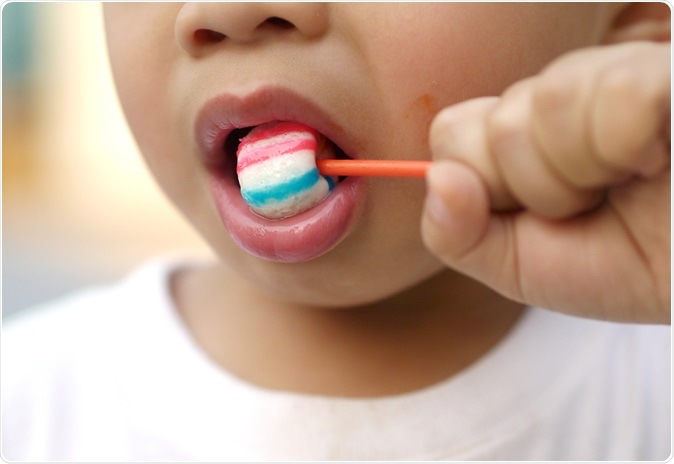A new study has shown that children in the United States are consuming too much added sugars and their daily intake exceeds the amounts recommended for adults.

Image Credit: FreeBirdPhotos / Shutterstock
Researchers noted that in their sample of participants, 99 percent of the toddles aged between 19 and 23 months were consuming an average of over 7 teaspoons of added sugar each day. This is more than the sugar contained in a bar of chocolate. At least 60 percent of the children were consuming added sugars before their first birthday, the study found.
Researchers warn that children this young consuming this amount of sugar could be at risk of obesity, asthma and also heart disease, high blood pressure and high cholesterol later in life. This is apart from the known risk of dental caries. The researchers explain that these kids could also be at risk of making bad food choices later in life.
Lead study author Kirsten Herrick, a nutritional epidemiologist at the Centers for Disease Control and Prevention (CDC) said, “This is the first time we have looked at added sugar consumption among children less than 2 years old… Our results show that added sugar consumption begins early in life and exceeds current recommendations. These data may be relevant to the upcoming 2020-2025 Dietary Guidelines for Americans.” She would be presenting this study results at the American Society for Nutrition annual meeting during Nutrition 2018, to be held June 9-12, 2018 in Boston.
The researchers explain that foods that contain added sugars are not beneficial for the body as they do not provide the benefits that fruits and vegetables that naturally contain sugars provide. These added sugars raise the daily calorie intake of the child. They are usually found in foods that do not contain natural fibres which are beneficial for health. Dr. Herrick said the easiest method of reducing added sugars in one’s own and one’s children’s diets is to choose foods that do not contain added sugars such as fruits and vegetables.
Herrick and her team looked at data from over 800 infants and toddlers for this study. The children were aged between 6 and 23 months. They were all part of the 2011-2014 National Health and Nutrition Examination Survey (NHANES), a research study. In a 24 hour window period, all the foods that the child was consuming was recorded. The team analysed the amount of sugar consumed by checking on amounts of cane sugar, honey, other forms of sugar such as high-fructose corn syrup etc. Sugars found naturally in fruits, vegetables and milk were not included in the analysis as were artificial zero-calorie sweeteners.
The results revealed that 85 percent of the toddlers and infants studied were consuming added sugars in their daily diet. With age the sugar consumption rose. While around 60 percent of babies between ages 6 months to 11 months consumed an average of 1 teaspoon of added sugars, 98 percent of children aged between 12 to 18 months were consuming an average of 5.5 teaspoons of sugar a day. By the time the children were between 19 to 23 months of age, 99 percent were taking in an average of 7 teaspoons of added sugar per day. Added sugar consumption was highest among non-Hispanic black children and lowest among non-Hispanic white children in kids aged between 12 and 23 months. These differences were not seen in the younger age group.
The researchers say that at present there are no specific recommendations for children under the age of 2 years in the US government’s 2015-2020 Dietary Guidelines for Americans (DGA). However soon to be developed is the 2020-2025 edition that will outline the recommended amounts of sugars and fats children under 2 should consume. At present the guidelines recommend using 6 teaspoons or less daily in individuals aged between 2 to 19 years and adult women and less than 9 teaspoons for adult men per day.
According to Herrick most adults are exceeding the recommended limits of sugar intake and this is reflected in the children of the household as well. She said that future studies are aiming at looking at the types of foods that are contributing to the excess sugar intake in kids as well. These could be from bakery foods or ready-to-eat breakfast cereals, desserts or sweets and candy.
Source: https://www.eurekalert.org/pub_releases/2018-06/n2-atc053118.php